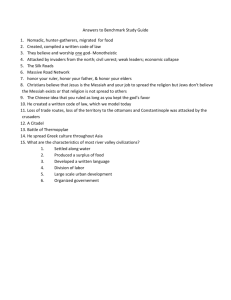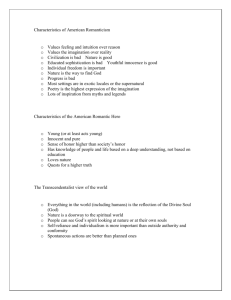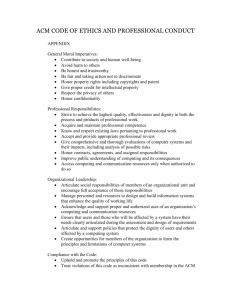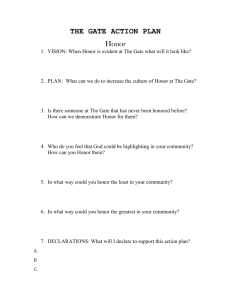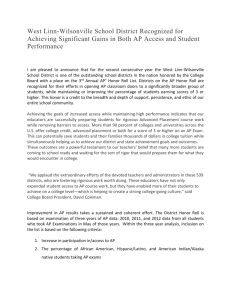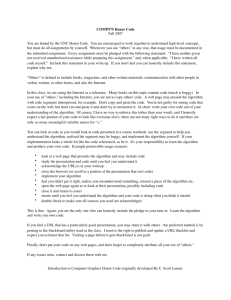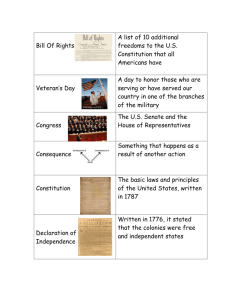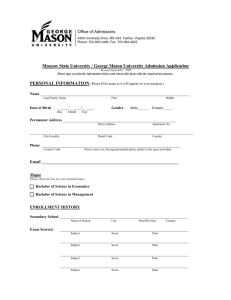Chen - John Jay College of Criminal Justice
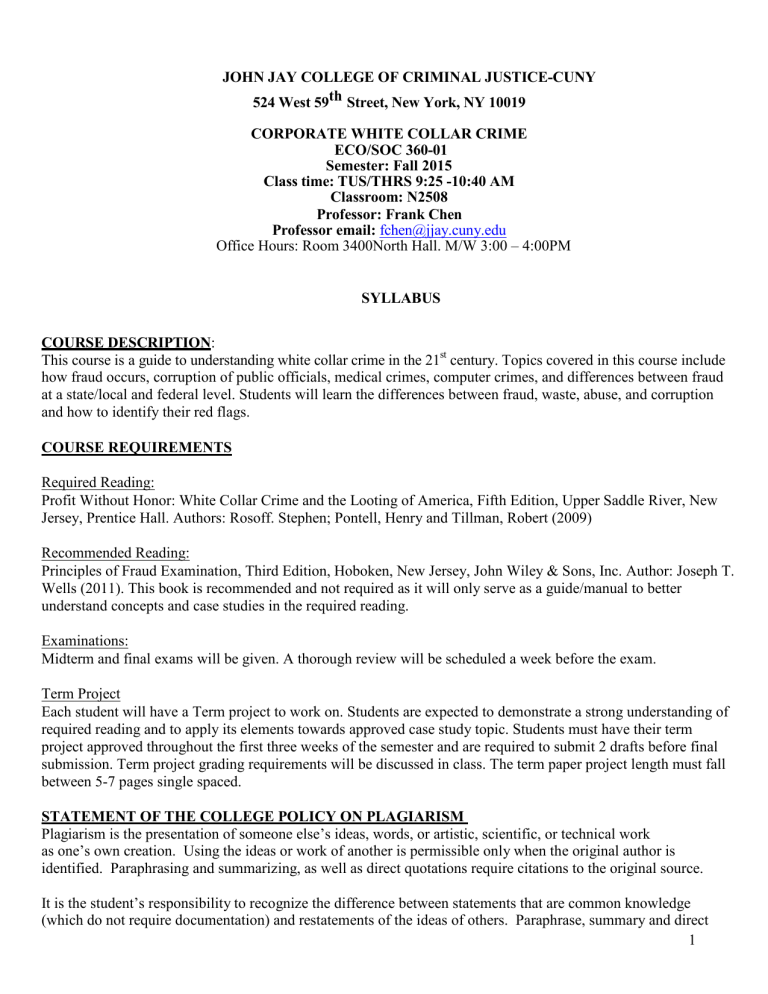
JOHN JAY COLLEGE OF CRIMINAL JUSTICE-CUNY
524 West 59th Street, New York, NY 10019
CORPORATE WHITE COLLAR CRIME
ECO/SOC 360-01
Semester: Fall 2015
Class time: TUS/THRS 9:25 -10:40 AM
Classroom: N2508
Professor: Frank Chen
Professor email: fchen@jjay.cuny.edu
Office Hours: Room 3400North Hall. M/W 3:00 – 4:00PM
SYLLABUS
COURSE DESCRIPTION :
This course is a guide to understanding white collar crime in the 21 st
century. Topics covered in this course include how fraud occurs, corruption of public officials, medical crimes, computer crimes, and differences between fraud at a state/local and federal level. Students will learn the differences between fraud, waste, abuse, and corruption and how to identify their red flags.
COURSE REQUIREMENTS
Required Reading:
Profit Without Honor: White Collar Crime and the Looting of America, Fifth Edition, Upper Saddle River, New
Jersey, Prentice Hall. Authors: Rosoff. Stephen; Pontell, Henry and Tillman, Robert (2009)
Recommended Reading:
Principles of Fraud Examination, Third Edition, Hoboken, New Jersey, John Wiley & Sons, Inc. Author: Joseph T.
Wells (2011). This book is recommended and not required as it will only serve as a guide/manual to better understand concepts and case studies in the required reading.
Examinations:
Midterm and final exams will be given. A thorough review will be scheduled a week before the exam.
Term Project
Each student will have a Term project to work on. Students are expected to demonstrate a strong understanding of required reading and to apply its elements towards approved case study topic. Students must have their term project approved throughout the first three weeks of the semester and are required to submit 2 drafts before final submission. Term project grading requirements will be discussed in class. The term paper project length must fall between 5-7 pages single spaced.
STATEMENT OF THE COLLEGE POLICY ON PLAGIARISM
Plagiarism is the presentation of someone else’s ideas, words, or artistic, scientific, or technical work as one’s own creation. Using the ideas or work of another is permissible only when the original author is identified. Paraphrasing and summarizing, as well as direct quotations require citations to the original source.
It is the student’s responsibility to recognize the difference between statements that are common knowledge
(which do not require documentation) and restatements of the ideas of others. Paraphrase, summary and direct
1
quotations are acceptable forms of restatement, as long as the source are cited. Students, who are unsure how and when to provide documentation, are advised to consult with me. The Library has free guides designed to help students with problems of documentation. (John Jay College of Criminal Justice Undergraduate Bulletin, http://www.jjay.cuny.edu/academics/654.php , see Chapter IV Academic Standards)
Instructor will use originality check softwares such as Turnitin/Safeassign. As students, you are encouraged to screen your final project before submission. If you have trouble using Turnitin/Safeassign, email your instructor at fchen@jjay.cuny.edu.
POLICY ON ATTENDANCE, ETIQUETTE AND PARTICIPATION:
Class attendance is mandatory, as is class participation. Students are expected to attend every class on time. More than 3 absences will affect the student’s grade. Arriving late twice is equivalent to one absence. It is your responsibility to inform the professor of your presence at the end of class so that your lateness instead of absence will be noted. If absent or late from class, it is the student’s responsibility to get notes from classmates. If you must leave class early, please let me know and sit by the door. Try to leave in an inconspicuous manner. Be sure to communicate with the professor ahead of time should you encounter any difficulties.
Participation counts for 10% of your overall grade. Students are expected to have prepared for class by reading the assigned materials and should be ready to be engaged in class discussion.
All electronic devices should be on vibrating or silent mode before entering class. Calling, texting, web surfing or checking emails, etc. will not be tolerated. Engagement in this type of behavior may cause the professor to ask you to leave and consequently count as an absence.
IMMEDIATELY schedule a meeting with me if you are having trouble keeping up with the material, attending class, completing the assignments, etc. By addressing the issue early, the damage can potentially be minimized.
EXAMS*:
1. The midterm exam will be held in class on 3/11/2015.
2. The final exam will be held at the scheduled time given by the Registrar’s office.
* All exams’ dates are subject to change.
Please note that NO MAKE-UPS WILL BE GIVEN FOR UNEXCUSED, MISSED EXAMS.
GRADING POLICY:
MID-SEMESTER EXAM
FINAL EXAM
25%
25%
CLASS PARTICIPATION
TERM PRESENTATION
10%
15%
TERM PAPER 25%
Your overall performance will be evaluated using the standard John Jay College grading scale.
2
Grade Numerical Value Percentage Equivalent:
A 93.0-100.0
A- 90.0- 92.9
B+ 87.1- 89.9
B 83.0- 87.0
B- 80.0- 82.9
C+ 77.1- 79.9
C 73.0- 77.0
C- 70.0- 72.9
D+ 67.1- 69.9
D 63.0- 67.0
D- 60.0- 62.9
F Below 60.0
MISCELLANEOUS INFORMATION:
This syllabus contains all the information you need to navigate the course over the term, and it is imperative that you use it to plan your course work. It is your responsibility to read and understand all the material in this syllabus. THE PROFESSOR RESERVES THE RIGHT TO MAKE ADJUSTMENTS
AND AMENDMENTS TO THE SYLLABUS AS HE SEES FIT. Before such adjustments and amendments, the professor will provide appropriate notice through Blackboard or email of any such adjustments or amendments.
SCHEDULE OF CLASSES
Please be prepared for each class by completing the assignments and readings prior to classes. As events unfold, there might be changes in this agenda. It is the responsibility of every participant to keep current with the assignments and changes to the agenda which will be communicated through Blackboard or email.
*Subject to change
Date Topic Reading/Deadline
August 27
September 1
September 3
September 8
Introduction to Corporate
White Collar Crime
History of Corporate White
Collar Crime
History of Corporate White
Collar Crime
Crimes Against Consumers
Profit Without Honor – Chapter 1
Profit Without Honor – Chapter 1
Profit Without Honor – Chapter 2
September 10
September 15
September 17 Unsafe Products
NO CLASS - Classes Follow a Monday Schedule
NO CLASS
Profit Without Honor – Chapter 3
September 22
September 29 Unsafe Products
October 1 Environmental Crime
NO CLASS
Profit Without Honor – Chapter 3
Profit Without Honor – Chapter 4
3
October 6
October 8
October 13
October 15
October 20
October 22
Environmental Crime
MIDTERM REVIEW
MIDTERM EXAM
Institutional Corruption
Institutional Corruption
Securities Fraud
October 27
October 29
November 3
Securities Fraud
Corporate Fraud
Corporate Fraud
November 5 Fiduciary Fraud
November 10 Fiduciary Fraud
Profit Without Honor – Chapter 4
Profit Without Honor – Chapters 1-4
Profit Without Honor – Chapter 5
Profit Without Honor – Chapter 5
Profit Without Honor – Chapter 6
Profit Without Honor – Chapter 6
Profit Without Honor – Chapter 7
Profit Without Honor – Chapter 7
Profit Without Honor – Chapter 8
Profit Without Honor – Chapter 8
November 12 Crimes by the Government
November 17 Crimes by the Government
Profit Without Honor – Chapter 9
Profit Without Honor – Chapter 9
November 19 Corruption of Public Officials Profit Without Honor – Chapter 10
November 24 Medical Crime
November 26
Profit Without Honor – Chapter 11
NO CLASS
December 1
December 3
December 8
Computer Crime
December 10 FINAL EXAM REVIEW
FINAL PAPERS DUE
December
15 – 23
FINAL EXAM
Profit Without Honor – Chapter 12
Presentation on Final Paper (1/2)
Presentation on Final Paper (2/2)
Exam Schedule.
SUBMIT VIA BLACKBOARD AT MIDNIGHT
In Class, per the official John Jay College Final
4

